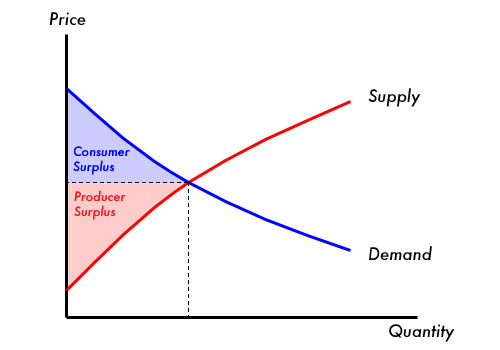I didn't actually hear about this at the time (to be honest, Whitney isn't exactly my thing so didn't follow any of the coverage) but it did appear as the weekend debate over on the Lib Dem Voice. I was intrigued by some of the responses that followed.
The problem comes, as far as the fans are concerned, they feel that Sony could have kept their prices the same and sold an even greater amount (Q3) of her music. In most industries this could be explained by the fact that the point for this lies to the right of the supply curve, i.e. the area where they aren't prepared to go, where it is is not cost effective to supply goods (the marginal cost is greater than the marginal revenue). In general terms there are always surplus' for parties when the equilibrium is found, however if the Quantity/Price point obtained was at point (Q3,P1) on the above diagram then there would also be a producer deficit.
So in general terms you would say that they are justified in raising their prices, otherwise they lose out. The problem for Sony however, where downloads are concerned at least, the marginal cost is pretty low, so much so that you'd expect the supply curve to plateau, they'd reach a price that was equal to their marginal cost (or a fraction above it) and they'd be happy to accept as many downloads as possible as their fixed costs wouldn't change - particularly as most of their items are actually sold through third party websites such as iTunes.
Now I get to the morality of it all. One poster said that another "know(s) the price of everything and the value of nothing" for pointing out the economic argument, however, surely by Whitney passing her music is now more valuable. As I said, any true fan would already have owned her music, her death has for some reason made it more desirable to own, nobody is forced to pay the price that Sony wants to charge and as it's a free market they should be able to charge what they like. I couldn't help but notice, when hunting for the first image I used in this post that the CD was out of stock on most websites. If pressure hadn't forced prices down then those who would derive more utility and therefore pay a higher price for her music would have had a greater opportunity to buy it rather than those who are considering it a casual purchase - for them to be out of stock it was quite clearly under priced.
As Simon McGrath says:
So assuming there is something in the contract where her estate receives a share of the proceeds then surely the moral thing is not to force a reduction in the price when those she left behind could have gained more from her talent.
At the end of the day, being priced out of buying her music does not stop anyone listening to it, I'd imagine that a fair amount had been on the radio and anyone who wants to listen digitally but doesn't want to pay the price that the owners of the music want to charge, they can just use Spotify!


No comments:
Post a Comment